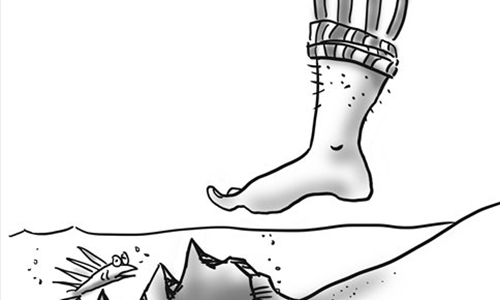
Over the last two weeks, the US government has repeatedly interfered in regional affairs in the South China Sea, disturbing the situation that is stabilizing.
Two US warships - an amphibious assault ship and a guided missile cruiser - are operating in the South China Sea, the US Navy said on Tuesday after the US State Department on Saturday called on China to "refrain from engaging in proactive and destabilizing activity" in the region.
This is an extension of the tough stance the US is taking against China and a trick that always played by Washington to seek any advantage. All the regional countries should be vigilant toward US' ploys.
Washington's policy toward China is crystal-clear. It is playing tough with China and raising the stakes of its strategic competition strategy. This has even become a rare bipartisan issue among US political elites and media outlets, who have fanned the flames of hostility against China, taking advantage of the outbreak of deadly COVID-19 that has yet to peak in the world's most powerful country. The entire US society is being incited as its leaders continue to find fault with China in every sphere possible.
The South China Sea issue is a key to the US strategy. Interfering in regional affairs is an important part of US attempts to contain and neutralize China. Even as Americans continue to suffer from their government's inability to curb the spread of the coronavirus, the Trump administration still insists on meddling in the South China Sea and smearing China. This has become the most effective method of deflecting pressure on the administration in the face of the coronavirus outbreak.
Being tough on China helps win points, which is exactly what the Republicans need during the presidential election campaign.
The so-called freedom of navigation operation carried out by US Navy is actually a violation of the principle of respecting sovereignty, which is the cornerstone of International Law. It's being US' long-term strategy to sow discord and escalate regional tension in order to fish profit, which increases uncertainties in the region.
The US believes that expanding the number of disputes in the waters, will spur regional countries to rely on the US even more, and thus it looks for excuses to justify its sovereignty-infringing moves in the South China Sea.
Long-standing, harmonious coexistence and stability in the region is not what the US wants. By claiming the right to so-called freedom of navigation, the US gets to show off its military strength in the South China Sea, even as its sailors are being endangered by COVID-19.
More than 160 countries have joined the United Nations Convention on the Law of the Sea (UNCLOS), but US has not even though it demands other countries to conform to UNCLOS directives. This surely reflects US' hypocrisy and two-faced character.
Currently, the most urgent and obvious challenge facing the US is the COVID-19 pandemic. It should be working jointly with other countries on this worldwide crisis rather than making new troubles in the South China Sea or anywhere else.
Although the countries of the South China Sea have disputes over relevant regional issues, they aim to settle the disputes through peaceful consultations. The US maneuvers are contrary to the expectations of these countries to resolve disputes in a constructive way.
US interferences in the affair of other countries and regions have a common theme - it messes up a place and then pulls out unscathed. Think of the Middle East, Afghanistan, Libya, and Ukraine. Settling regional disputes through peaceful negotiations is not US' cup of tea. All countries around the South China Sea need to maintain a sober mind to this reality.
The article was compiled by Global Times reporter Xu Hailin based on an interview with Li Haidong, a professor at the Institute of International Relations of China Foreign Affairs University.













